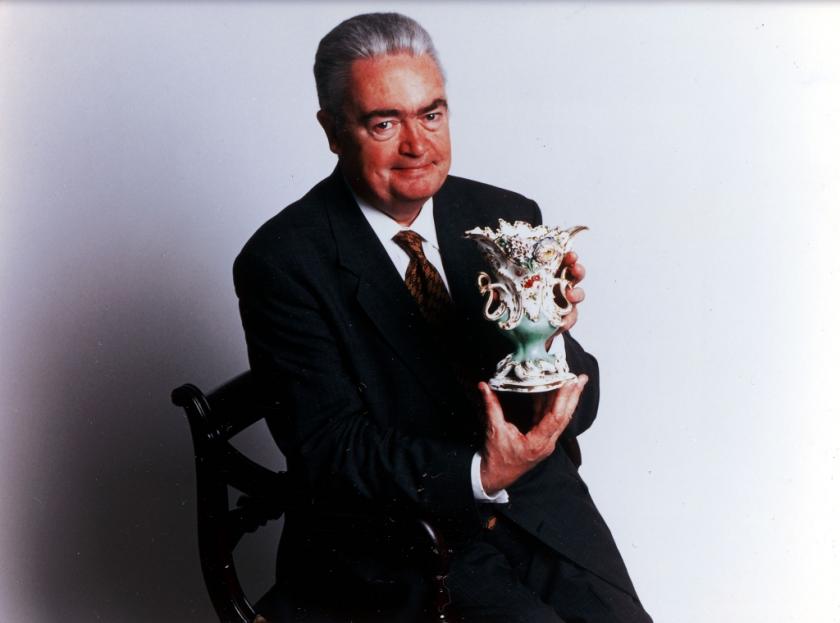"I walked into her office and started the usual small talk about what a charming room it was and what a lovely view and I do like your curtains. She didn't know me from Adam - she didn't watch Antiques Roadshow, and she wasn't interested in my small talk about furnishings. She said, 'Yes, yes, come and sit down. Now tell me, what do you know about the Franco-Prussian war?'"
Hugh Scully's long years thinking on his feet in live television, first for the regional news show Points South West and then Nationwide, must have come to his aid as he muttered something about "1870 . . . major turning point . . . helped to shape the history of the 20th century". Then Mrs Thatcher began talking, and Scully listened. In all, he listened for nearly 40 hours, as the cameras filmed the core interview of The Downing Street Years.
Hugh Scully has died at the age of 72 after a long career which was about rather more than showcasing the public's old bric-a-brac all over the country early on Sunday evenings. If there was a theme to Scully's diverse broadcasting career it was, he told me, that "most of my lucky breaks have been associated with ships and unfortunate circumstances". His first assignment on radio was reporting on a vessel that caught fire in Southampton dock in 1963, and his first big exposure on network television came when the tanker Torrey Canyon struck a reef off the Scillies. But the scoop of scoops for his production company, Fine Art (founded in 1988), came when the good ship Margaret, cast off from its moorings at No 10, chose to reveal its log to the world.
Scully was born in Bradford-on-Avon at the end of the Second World War. But, because his father was stationed with the RAF in Malta and Egypt, he only came to England properly at 13, when he was sent to a Catholic boarding school in Bath. He got a job in "artist liaison" with Steinway & Sons, the piano-makers. There, he rubbed shoulders with Rubinstein, but was sacked for "bad time- keeping" and found himself at a loose end. Journalism beckoned, but no newspaper wanted to know - so he made speculative enquiries at the BBC.
"It was quite a cheeky letter: I gave them 10 good reasons why they ought to give me a job. They were looking for a temporary newsreader, so I had an audition. Much to my surprise I had a telegram immediately saying turn up at BBC Southampton the following Monday. I think I got the job purely on the basis of the voice."
His smoothly honed BBC English, all sculpted vowels with a hint of gravel, was only one asset. The fact that he lasted so long in every job he held - 16 years at the BBC in Plymouth, 18 years as presenter of Radio 4's Talking about Antiques and 19 presenting Antiques Roadshow - cannot be put down solely to the fact that he sounded and looked like an affable, mildly racy uncle. As with so many long-running broadcasting careers, chance played its part.
Scully's fortunes changed when a BBC producer visited his south Devon home, which was cheaply but tastefully furnished with antique tat. When a presenter was needed for an antiques radio show, the producer remembered the regional link-man who owned the Welsh dresser and the button-back chair.
"I said, 'I don't know anything about antiques,' but he said, 'You've got a feel for it, and anyway we've got two experts in the team - your job is to simply chair the discussion and to ask the sort of questions that the ordinary punter would want to ask.'"
If you were not interested in antiques, though, you were most likely to think of Scully as one of those regional faces from Nationwide who moved to London (in 1978) and became a national one. "So many broadcasters had their first exposure through Nationwide. It was a marvellous formula. The BBC got tired of it because they thought it had lost its way. Maybe it had, but to throw the baby out with the bath water seemed to me rather ill-advised."
Scully was always a freelance, but he became a fixture at the BBC - like an old chair that you show off in the hallway, elegant and antique, but still solid and useful. "I think it's dangerous to say you're part of the furniture," he told me, "because you can easily see the removal men coming."















Add comment